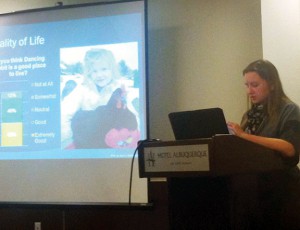
“Ecovillages are not the answer,” Dr. Joshua Lockyer told the audience at the Ecovillage panel at the Society for Applied Anthropology conference in Albuquerque, New Mexico this March. A constant champion and visitor to Dancing Rabbit, Dr. Lockyer is an anthropologist in the forefront of studying intentional communities.
“Ecovillages are not the answer; they are laboratories for change in broader society.” His words may have sounded harsh at first listen, but they were rooted in hope. “Transformation is a process. It doesn’t happen all at once.” From those simple, straightforward statements, I saw a new, outside look, an academic look at what we just call ‘home’.
Nik here, freshly returned from a rare vacation in the Southwest. In my new attempts to be more sustainable in my travel footprint, I opted to take the bus instead of flying or renting a car as I previously would ought to do. Unfortunately it was a rude awakening to the world of underfunded mass transportation—a 12-hour ride from Dallas to Kirksville turned into a 3-day adventure that sometimes felt like I was trying to reach Mt. Doom in Mordor… Next time I’ll try the train…
The trek down to Dallas was an easy and fun carpool with fellow Rabbits and two Texas natives, Brooke and Ashly. The terminus of the trip was the SfAA (Society for Applied Anthropology) conference in Albuquerque, where Brooke, an anthropology grad student, was presenting. Over the last year, she had been collecting data from the village (waste & recycling, power usage, vehicle & fuel usage, and interviewing for a sense of general well-being) for her thesis project. The panel she presented with focused on different ecovillages and intentional communities all over the world, and it happened to be one of the higher attended discussions of the whole conference!
Aside from Dancing Rabbit, villages were studied in New York, Italy, North Carolina, and Eastern Europe, as well as a community garden in inner-city Oakland, California. The extremes of the spectrum were represented in the research; from far-flung hippiedom experimentalists in the Piedmont region of Italy to far more practical organizations to help the disenfranchised find skills and community. Seeing Brooke’s presentation on Dancing Rabbit abutted against the others truly galvanized the pride I felt for where I currently call home.
Same with seeing the side by side data comparisons of the “Average Rabbit” to the “Average American”—it was shocking to see a graph of how few resources we live on here; in fact we often hear on the streets (or footpaths) that at DR “we should be doing more!” and “we’re so mainstream!” or “life is too easy here…”
The numbers don’t have an agenda, and it was good to feel validated in the fact that we are making progress on the life less consuming. Generally, consumption and waste at DR was ten times less than average across the board, and the state of well being and happiness reported by most Rabbits was ranked good or very good.
As one of the ethnographic subjects of these studies, I might venture to say that the ability to be more emotionally resourceful in a close community with many support groups may be a big factor in this community’s residents’ well being. And really all around, becoming more resourceful seems to breed a need to learn new skills one never thought they would ever employ.
For instance, Brooke’s family hosted our group in Texas, and we wanted to cook them a nice meal in appreciation. Brooke was saying that cooking for fifteen people would have once put her in a dead panic, but since cooking at DR, it didn’t seem like any bigger of a deal than cooking for four. This whole notion, which may resonate with members of any community, small or large, was summed up beautifully by one of the other speakers at the conference, Dr. Tendai Chitewere of San Francisco State—“Wealth is not abundance in itself…but the ability to create abundance.”
Interns, visitors, and even members come and go at Dancing Rabbit. They leave in tattered, but well-patched clothes that came there fresh off the rack. They head to the train or the bus station, much wealthier than they arrived.
Dancing Rabbit wasn’t the answer for them, but it was the start or part of their process in changing the world.
Speaking of which, visitor, work exchanger, and tour season is upon us! The first public tour of the year is April 12 at 1 pm, continuing on the second and fourth Saturdays of the month through October. The tour begins at 1:00 pm, generally lasts one and a half to two hours, and is free (though donations to our non-profit are gratefully accepted). Reservations are not needed for the regularly scheduled Saturday tour.
Dancing Rabbit Ecovillage is an intentional community and nonprofit outside Rutledge, in northeast Missouri, focused on demonstrating sustainable living possibilities. Find out more about us by visiting our website, reading our blog, or emailing us.
